Stargate SG-1: Season 1
Executive producers: Jonathan Glassner & Brad Wright
Co-executive producers: Michael Greenburg, Jeffrey King
Original air dates: July 27, 1997 – March 6, 1998
Mission briefing: Picking up one year after Stargate, we learn that O’Neill, Kawalsky, and Ferretti reported that the nuke went off, destroying the entire settlement on Abydos, killing Jackson. O’Neill then retired, and the Stargate program was mothballed. Personnel have been slowly rotated out of the lower levels of Cheyenne Mountain—until one day, when five airmen (well, four airmen and one airwoman, Sergeant Carol Weterings) are playing poker in front of the gate, covered in cloth. The gate activates, and Apophis comes through with several of his Jaffa (including his First Prime, Teal’c). Weterings is kidnapped and taken back through the gate, and the other four airmen are killed in a firefight.
General George Hammond, who has taken over command of Cheyenne from General West, gets O’Neill out of retirement and brings in Kawalsky and Ferretti. O’Neill admits the truth of what happened, and Hammond sends a team that includes the three survivors of the first mission, as well as Captain Samantha Carter, an astrophysicist who did quite a bit of work on the theoretical side of doping out the Stargate.
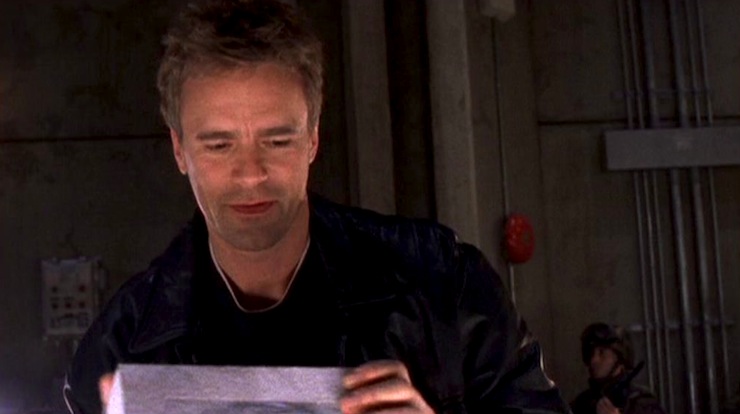
Upon returning to Abydos, they’re reunited with Jackson, Sha’re, Skaara, and the rest of the gang. Jackson reveals that he’s found a cartouche filled with gate addresses. Between them, he and Carter figure out that there’s a vast gate network, and the reason why none of the gate combinations they tried have worked is because of stellar drift over the thousands of years since the chamber was constructed.
Apophis shows up on Abydos, still kidnapping folks, this time taking both Sha’re and Skaara. Before lapsing into unconsciousness from the attack, Ferretti sees the address that Apophis enters into the dial-home device (DHD, the one thing they never found in Giza).
Jackson returns with the team, and Hammond announces that the president has authorized the formation of nine teams that will do reconnaissance through the various gate addresses that they’ve gotten from the Abydos cartouche. O’Neill and Kawalsky are given command of SG-1 and SG-2, respectively, with Carter and Jackson serving on the former. They go through the gate to Chulak. SG-1 is captured, after they learn that Apophis has selected Sha’re to host his bride Amonet (Weterings was considered and rejected by the symbiote, after which Apophis killed her), while Skaara has been chosen to host Klorel.
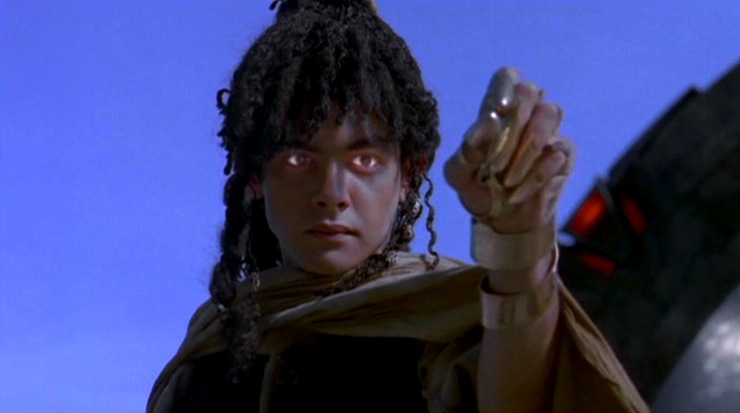
SG-1 escapes with Teal’c’s help. Seeing the technology of Earth, Teal’c believes that he has at last found allies who can help him rebel against the Goa’uld; he returns to Earth and eventually becomes part of SG-1. Stargate Command continues with its mission to explore and learn more about the greater galaxy, but O’Neill and Jackson have a personal stake, too: to find Skaara and Sha’re and rescue them from the Goa’uld that they have been forced to share their existence with.
Unfortunately, they have a more immediate problem: Kawalsky, who is also possessed by a Goa’uld. O’Neill is forced to kill his best friend in order to save him.
The SGC mostly explores via trial and error. SG-1 brings a disease that de-evolves people back to Earth, the leader of SG-9 goes rogue and takes over a planet by posing as a god the way the Go’auld do, O’Neill is infested with nanites that age him rapidly, SG-1 brings a young girl named Cassandra through the gate only to learn that she’s been implanted with a bomb, Jackson is kidnapped by an alien who’s trying to find his wife, and a scientist creates perfect android duplicates of SG-1 (who think they are SG-1).
And there’s more to the Goa’uld than Ra and Apophis. A dig in Mexico digs up Hathor in a sarcophagus, and she almost takes over the SGC with her ability to captivate men, but a female team led by Carter and Dr. Janet Fraiser (with help from Teal’c, also immune) take the base back.
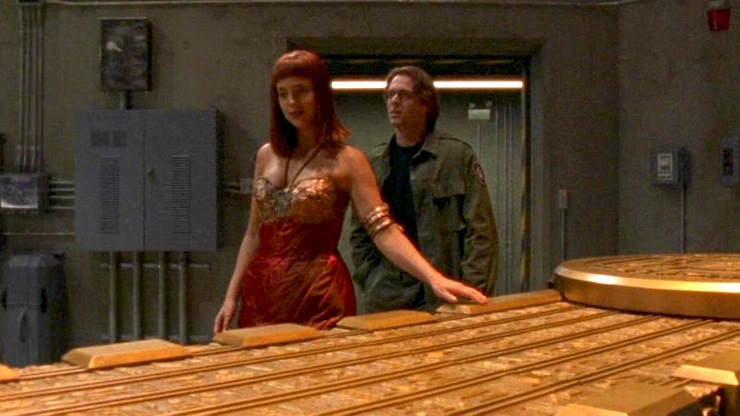
But they do find that it’s not just Goa’uld and Jaffa out there. They meet friendly advanced species the Nox and the Tollan, they learn of the Asgard, and they meet another ally among the Jaffa in Teal’c’s mentor, Bra’tac. Most impressively, they rescue the first person to go through the Stargate in the 20th century, Ernest Littlefield, the fiancé of Catherine Langford, who went through the gate in 1944 and was then lost. The planet Littlefield went to, Heliopolis, reveals the existence of four great races, who will eventually be identified as the Asgard, the Nox, the Furlings, and the Ancients.
In addition, Carter and O’Neill discover a second gate on Earth, located in Antarctica. So now they have a backup…
There are personal crises as well. O’Neill is forced to confront the pain of his son’s accidental suicide thanks to an alien creature that possesses him, Jackson is transported to an alternate reality in which Apophis invades Earth and kills millions, Carter has to confront her ex-fiancé, who’s gone nuts, while Teal’c faces the opprobrium of his wife and child, whose lives have been made miserable by Teal’c’s betrayal of Apophis (though they do come around eventually).
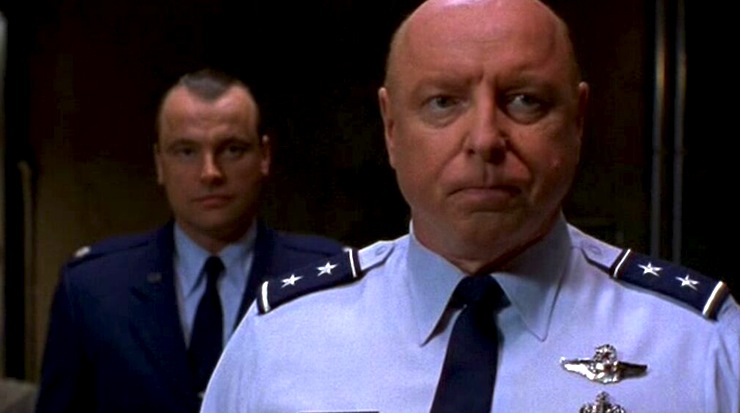
Politics at home are an issue, too, from the shadowy organization known as the NID, which has its own agenda for the Stargate and wants it out of Air Force hands, to Senator Robert Kinsey, the head of the appropriations committee, who views the Stargate as a dangerous and unnecessary expense.
Kinsey succeeds in shutting the SGC down, but then two Goa’uld motherships containing Apophis and Klorel, set course for Earth. And SG-1 may not be able to stop them…
Best episode: “Within the Serpent’s Grasp.” The first-season finale is a tense adventure, building on the fears stoked by Jackson’s alternate reality trip in “There But for the Grace of God…,” with the personal stakes of Skaara’s possession by Klorel affecting O’Neill, as well as Teal’c’s status as a traitor. And the cliffhanger is devastating, as the two motherships approach Earth.
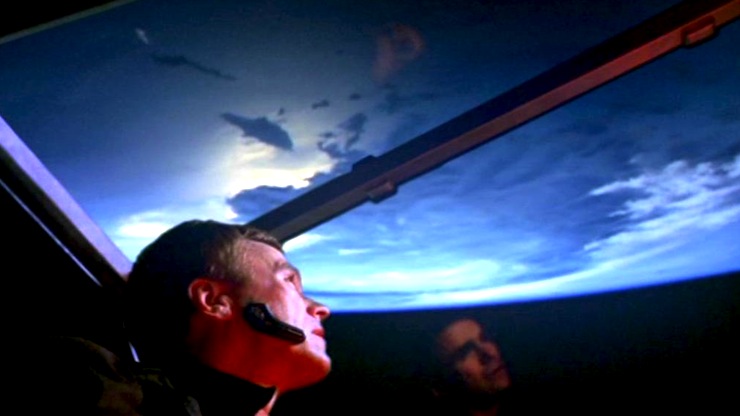
Honorable mentions: The aforementioned “There But for the Grace of God…,” which does the alternate-reality episode that’s become a cliché since “Mirror, Mirror” on the original Star Trek, but which SG-1 does with devastating effectiveness here, using the concept to show what would happen if Apophis invaded without actually having Apophis invade.
“The Torment of Tantalus,” for bringing back Langford (and her father in flashback), showing the early experiments on the Stargate and setting the stage for the galactic history that all three TV shows would flesh out over the next several years.
“The Enemy Within,” a second episode that shows in depth what the Goa’uld do to people by its corruption of Kawalsky, a character we know and like.
“Enigma,” a very well written introduction to the Tollan, showing that not all the humans who were removed from Earth to develop on their own stayed primitive.
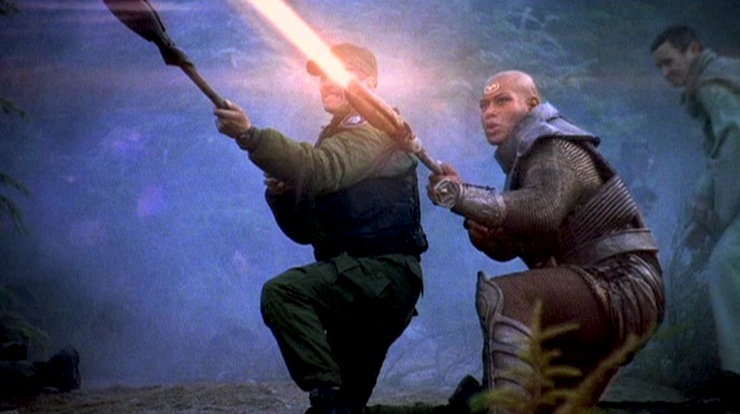
And “Children of the Gods,” which does a superb job of taking what was established by the movie and expanding it.
Worst episode: “Emancipation.” A dreadful cliché, retreading the same idiotic ground that the episode’s writer, Katharyn Powers, trod in the Star Trek: The Next Generation episode “Code of Honor,” and this one is only slightly better in that Amanda Tapping is a better actor than Denise Crosby and this episode also has Cary-Hiroyuki Tagawa and Soon-Teck Oh in it, though even those two phenomenal actors aren’t enough to overcome a tired script.
Honorable mentions: “The Broca Divide,” about which the nicest thing you can say is that they got the stupid de-evolving episode out of the way early, and “Brief Candle,” which got the stupid rapid-aging episode out of the way early.
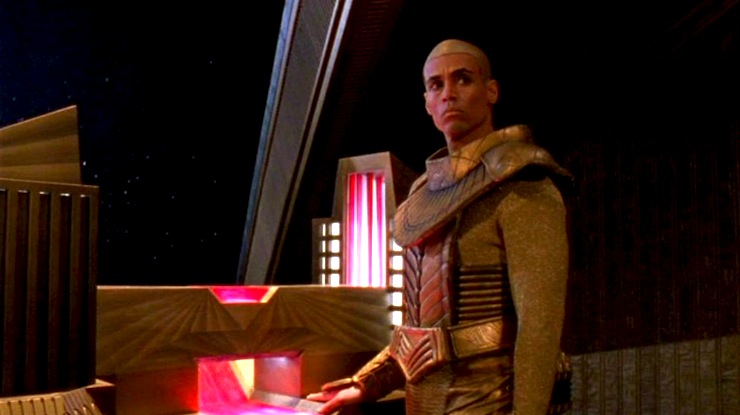
Can’t we just reverse the polarity?: Stellar drift is used as the reason why none of the gate combinations they’ve tried have worked, and Carter works out a program to readjust for that drift and recalibrate the gate addresses. The SGC is exposed to some spiffy advanced technology—besides the usual Goa’uld goodies (both stuff from the movie, and new things like the healing device and the zat’nikatels), we also meet the Nox and the Tollan and their pretty toys (hiding entire cities, walking through walls, and so on), and the quantum mirror that sends people to alternate timelines.
For cryin’ out loud!: From jump, Richard Dean Anderson’s O’Neill is more relaxed than Kurt Russell’s, but the sea-change actually occurs in “Brief Candle,” when O’Neill credits Kynthia with making him see the importance of enjoying life. After that episode, O’Neill is even more like the devil-may-care O’Neill we come to know and love throughout the series.
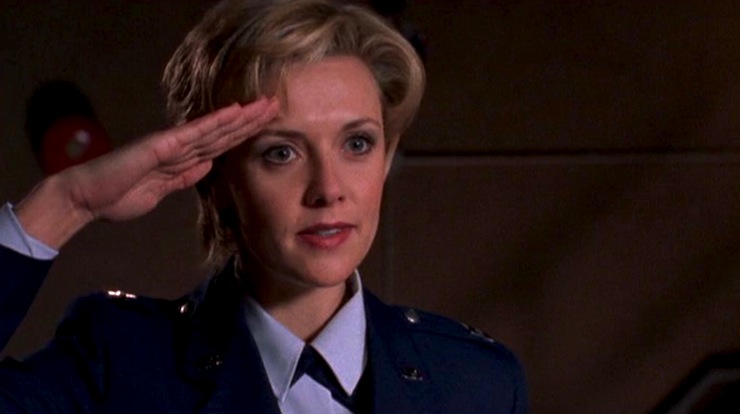
It might work, sir: Carter’s rather up-and-down romantic history is introduced in “The First Commandment,” where we meet her ex-fiancé and he’s a megalomaniacal douche. Her flirtation with Narim of the Tollan kicks off in “Enigma,” at the end of which Carter gives Narim a cat. We also see Carter’s ability to take charge and kick ass (presaging her eventually taking over SG-1 in season 8, commanding Atlantis base in SGA season 4, and commanding her own ship as seen in SGU) in “Hathor” when the men are, ah, indisposed.
I speak 23 different languages—pick one: Jackson has his heart ripped out in the very first episode, as his blissful life on Abydos is yanked away from him by Apophis, who turns his wife and brother-in-law into Goa’uld. His knowledge of history and language proves very useful in making first contact with everyone from the primitive Land of Light (“The Broca Divide”) to the advanced Tollan (“Enigma”).
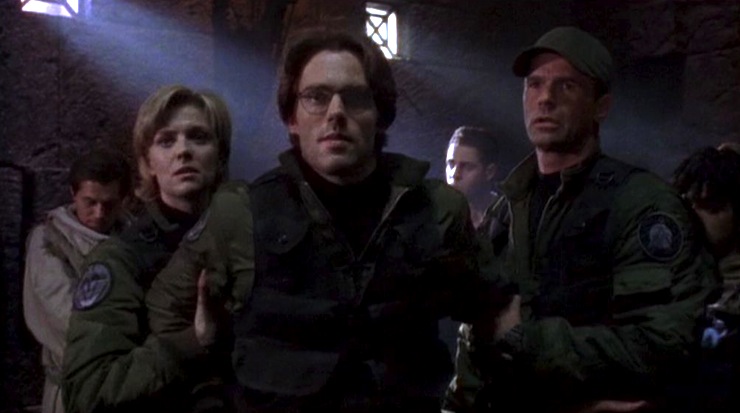
Indeed: Teal’c sacrifices everything to join SG-1—the depth of this sacrifice isn’t seen until “Bloodlines”—and proves a useful source of information, not to mention his ability to kick major ass.
You have a go: Far from the hardliner cliché of a military general, Hammond shows compassion and intelligence from the beginning, expertly manipulating O’Neill into telling the truth about what happened on Abydos in “Children of the Gods,” but refusing to kill thousands of innocents. He does everything he can to protect the people under his command, including performing that most important of tasks a supervisor can do: being a shit umbrella, keeping the crap from on high from affecting those below him. (Though that umbrella gets a few holes in it thanks to Kinsey in “Politics.”)
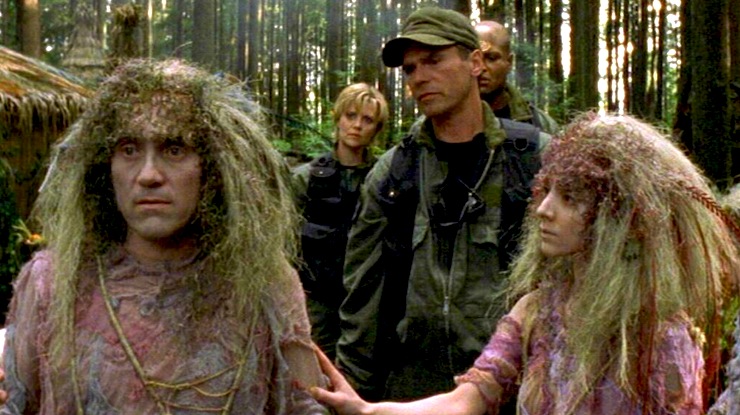
Wayward home for out-of-work genre actors: Armin Shimerman (Quark on Star Trek: Deep Space Nine and Principal Snyder on Buffy the Vampire Slayer) appears as one of the Nox in that species’ eponymous episode. Robert Wisden, veteran of The X-Files and Highlander, among others, appears twice as Samuels. And Ronny Cox, famous for his roles as antagonistic characters in RoboCop and in Star Trek: The Next Generation’s “Chain of Command” two-parter, makes his first of many appearances as Senator Robert Kinsey.
Trivial matters: Several characters from Stargate are carried over, all but one of whom are re-cast: O’Neill, Jackson, Skaara, Sha’re, Kawalsky, Ferretti, Sara O’Neill, and both Catherine and Paul Langford. Alexis Cruz (Skaara) is the only actor who reprises his role, while Richard Dean Anderson and Michael Shanks play O’Neill and Jackson, with Jay Acovone and Brent Stait playing Kawalsky and Ferretti, Harley Jane Kozak playing Sara, and Elizabeth Hoffman (Catherine) and Duncan Fraser (Paul) playing the Langfords.
Ra’s species is given the name of Goa’uld, and it’s established that Ra wasn’t the only one who set him-or-herself up as a mythological god—this season, we meet both Apophis and Hathor. The aliens who possess humans are established as being serpentine, and the Jaffa host the larval form until they mature and take a host.
Several items from the film are seen again, like the Goa’uld mothership, the Jaffa, the hand device, the staff weapon, the sarcophagus, the MALP, and more, plus we get new stuff like the DHD, the healing device, the zat’nikatels, etc.
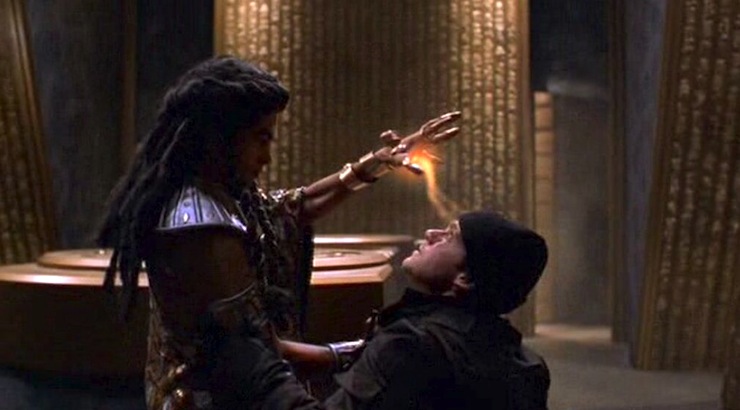
The base where the Stargate is kept is now Cheyenne Mountain rather than Creek Mountain (though it’s explicitly stated to be the same facility), the Langford family no longer speak with accents, and Abydos is now very proximate to Earth instead of “on the far side of the universe.”
Roc Books published two lines of Stargate novels—spinoffs of the film, written by Bill McCay, which did not tie into the TV series in any way, and SG-1 novels written by Ashley McConnell. The latter included a novelization of “Children of the Gods” and three original novels.
O’Neill’s deceased son is given the name of Tyler in the film, but is named Charlie in the series. (In McCay’s novels, he was named Jack O’Neill Jr.)
Chevron seven locked: A relatively strong first season. It’s harder to rewatch this season now after the extensive history that the franchise has developed in the ensuing years. It’s also kind of hilarious how badly they stumble through their explorations. Basically, they don’t do anything sensible until they do something stupid, realize it’s stupid, and fix it—which wouldn’t be so bad if they didn’t endanger the entire planet every time they did something stupid.
On the other hand, at least they learn from their mistakes—so they can make newer, more interesting mistakes! But we see the progress they make as they figure out how to be explorers and also prepare for what might happen.
A lot of what’s best about SG-1 really isn’t on display here—or if it is, it’s only seen briefly. Episodes like “Enigma,” “The Nox,” “Thor’s Hammer,” and “The Torment of Tantalus” do a wonderful job of setting up future storylines, but it’s mostly throwing stuff against a wall. For all that Apophis is supposed to be the big bad, he really only shows up at the beginning and end of the season, plus once in the middle (“The Nox”). The notion of a whole mess of Goa’uld out there isn’t really explored yet, beyond Hathor’s appearance.
But even as the writing is feeling its way around to what the show will become, the acting is already pretty solid.
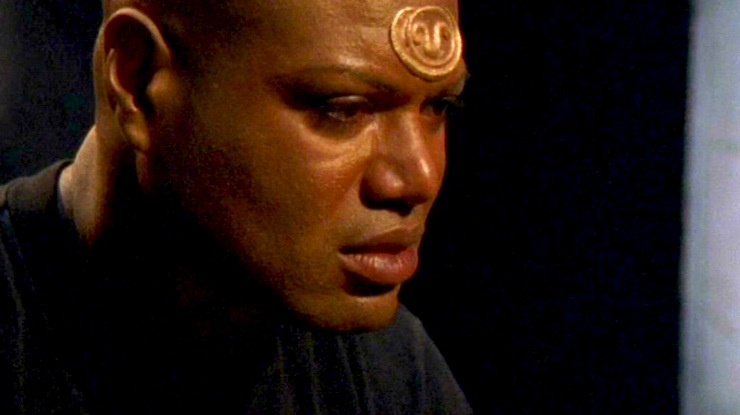
Christopher Judge manages to convey a great deal with his varying facial expressions, from the subtle torment in “Children of the Gods” as he does awful things in Apophis’s name, which O’Neill picks up on and encourages, to the out-and-out anguish when he’s put on trial in “Cor-ai.”
Michael Shanks starts out doing a great James Spader impersonation and slowly makes the role his own, in particular allowing the character a great range of emotion, from the pain of Sha’re’s kidnapping in the pilot to the wonder of discovery in “The Torment of Tantalus” to his frustrated outrage at what he saw in “There But for the Grace of God…” and the inability of anyone to appreciate it to his satisfaction in “Politics” and “Within the Serpent’s Grasp.”
Richard Dean Anderson does no kind of Kurt Russell impersonation, and moves farther away from the chain-smoking hardass of the film, playing him more like the cynical-but-compassionate leader. But he has his demons, mostly seen in his anguish at Skaara’s kidnapping in “Children of the Gods” and “Within the Serpent’s Grasp,” and he does more with the pain of his son’s death in “Cold Lazarus” than Russell managed in the entire movie.
But the breakout here is Amanda Tapping, whose Samantha Carter is one of the finest characters to grace the science fiction television landscape. She’s brilliant, resourceful, modest (every time she proposes a theory or hypothesis, she qualifies it up the kazoo, is sure to explain how badly it can go wrong, and refuses to gloat when it succeeds), tough, clever, and a huge asset to SG-1. It took the writers a while to get a handle on her—her initial dialogue with O’Neill, Kawalsky, and Ferretti in “Children of the Gods” is embarrassingly clumsy (to the show’s credit, they’d make fun of the reproductive organs line several times in the future), and her earliest spotlights in “The First Commandment” and “Emancipation” show an appalling lack of imagination—but as the season goes on you can see the greatness that will develop. In particular, she makes the overdone men-are-bamboozled plot of “Hathor” work (aided and abetted by Teryl Rothery’s Janet Fraiser, who would go on to become a critical supporting character) with her no-nonsense military approach.
Keith R.A. DeCandido is hard at work on Kali’s Wrath, an SG-1 novel taking place in the fifth season. His Carter-and-Teal’c story “Time Keeps on Slippin’” can be seen in the anthology Far Horizons.










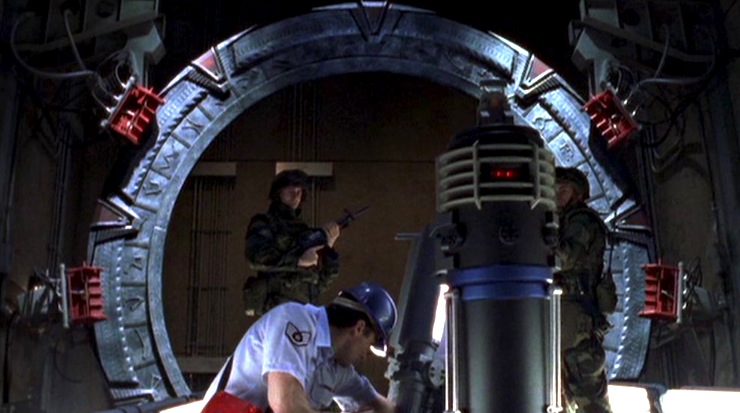
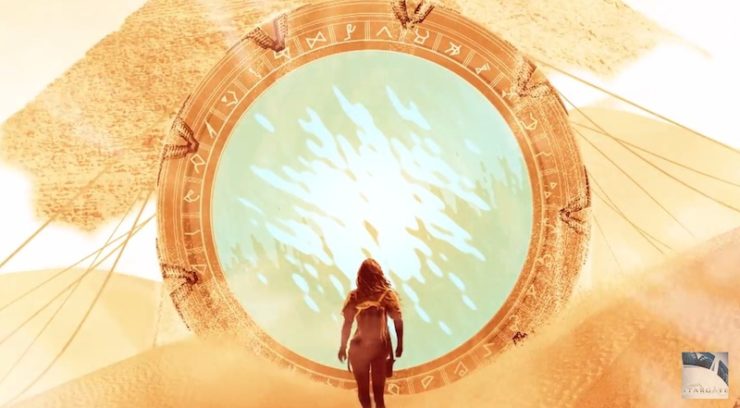
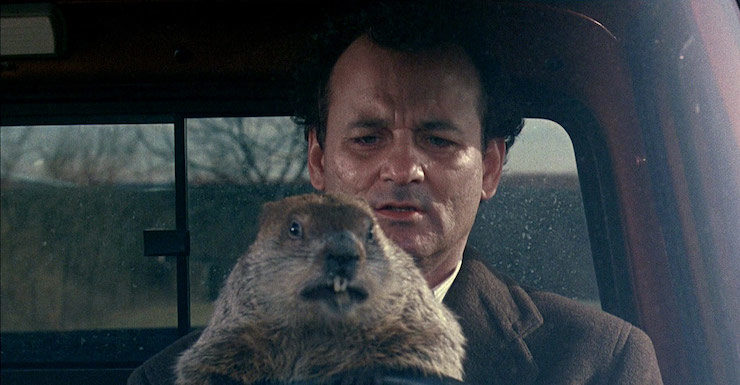
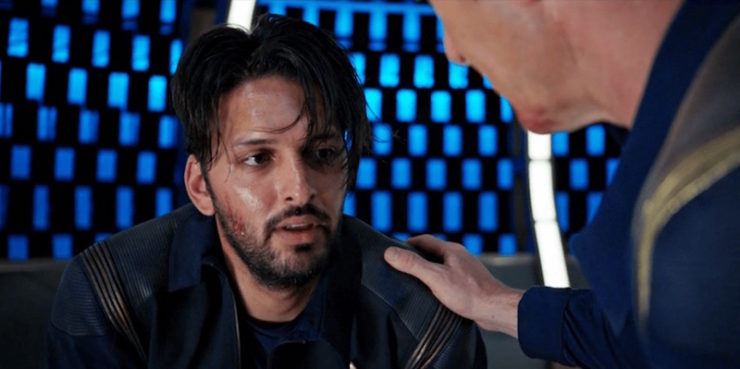
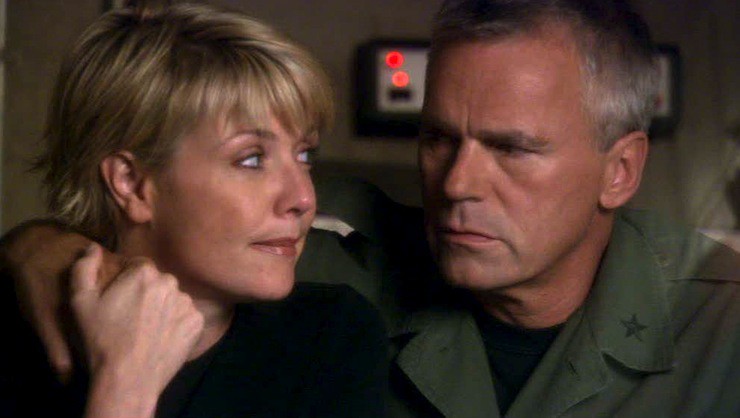
Hooray, rewatch ahoy!
I was surprised “Politics” did not rate a (dis)honorable mention for Worst Episode. I guess clip shows are just not even trying, so making them the “worst” would be a gimme. I would also have considered “Hathor” for worst, given that the producers kind of apologized for it. Suanne Braun is pretty, but it doesn’t make up for the plot.
I love Sam Carter so much. Oh hey, lemme just reprogram this thing…ta-da, we can explore the galaxy! I know that sometimes her skills are exaggerated somewhat to serve the plot, but still, having a woman in the position of writing code to get things done is so freakin’ awesome. And, as you said, she kicks ass in command, too. Of course, if she were as in awe of her own skills as we are, we wouldn’t be using “It might work, sir” as the tag for her – she’s overly modest, really – but I still think she’s the bee’s knees. (Amanda Tapping is a lovely person, too – I’ve met her a few times and she’s delightful.)
As for O’Neill being devil-may-care, didn’t he insist he get to play it more comedic than Kurt Russell before he’d even come on board? I seem to recall the differences between movie O’Neil and TV O’Neill were largely driven by RDA himself rather than the writers.
Armin Shimerman was hardly “out of work” though, as he was appearing on both DS9 and Buffy when he made this appearance. ;)
Lovely first seasonal rewatch, Keith. Bring it on!
Not true – the second one is Erick Avari as Kasuf, leader of the Abydonians (?) and Skaara’s (and Sha’re’s) father.
Spriggana: I didn’t mention Kasuf because he didn’t appear in the first season.
—Keith R.A. DeCandido
I came to the show in Season 3 I think, I just wasn’t watching TV at the time, now I have it all on DVD and have watched it a few times. There is the odd stinker, but that’s expected with 20+ episodes per season, overall, it’s truly great.
Good things from the first season: the friendship between Jack and Daniel; Carter’s generally being a competent officer who just happens to be a woman; the portrayal of the military as generally competent, but without jingoism.
“There But For the Grace of God” is one of my favourite alternate-timeline episodes of any show — they managed to come up with good, reasonable explanations for why the regular cast was there (or not there, in the case of Daniel).
The Nox were my favourite alien race on the show; I don’t think any of the others displaced them.
As for Carter’s romantic life: a god fell in love with her. You gotta admire a show that did that well.
Keith, are you doing a whole season at a time, rather than individual EPs?
redheadedfemme: Yes, it’s a seasonal rewatch.
—Keith R.A. DeCandido
I never knew “Emancipation” and “Code of Honor” were written by the same person. That explains a lot. I also find it interesting that both episodes came at the same place in the first season of their respective shows.
I don’t have season 1 quite yet, but I did watch the “Children of the Gods” final cut in preparation for the rewatch. One thing that struck me is that O’Neil says of the Jaffa, “There weren’t creatures like this on Abydos.” While he may be specifically referring to the people of Abydos, I would think the line would include Ra’s gaurds, whom he saw without shirts. It lends a little bit of credence to my fan musings that perhaps Ra’s guard could be made up of elevated normal humans, or perhaps his Goa’uld lieutenants whom Ra requires to speak in normal human voices rather than Goa’uld voices. But those are some just for fun thoughts.
I think besides the episodes you mentioned as contending for the best, a standout for me is Cor’ai, because I like the episodes that explore that Teal’c’s life in the service of Apophis was mired with doubts.
Wow, seeing the first season summed up like this makes it seem a lot stronger than I remember. I tend to remember it largely for the duds like “Emancipation,” “The Broca Divide,” and “Hathor.”
Oh, gods, “Emancipation.” What isn’t wrong with this one? Katharyn Powers didn’t bother to do any anthropological research, just threw in a bunch of Orientalist cliches. The idea of Mongols sequestering their women is nonsense. A nomadic culture can’t afford to have members who don’t pull their own weight, and can’t sequester women apart from men when they don’t even stay in one place. Women in Mongolian and other horse-nomad cultures tended to be more equal than in sedentary agrarian societies, participating in combat and politics alongside the men.
Not to mention… societies that believe women should hide their faces behind veils generally do not also give them plunging necklines to show off their cleavage!!! The whole reason for veiling is modesty! I mean, I have absolutely nothing against seeing Amanda Tapping’s cleavage, as a rule, but it just made no damn sense in this context.
Ahem. Anyway…
As for the season as a whole, it is an improvement on the movie, but an awkward start to the series. It’s good that they added more diversity to the cast, but they handled Carter badly at first with the “reproductive organs” speech, and Teal’c was too much in the stereotypical Big Angry Black Man mode, though it’s to Christopher Judge’s credit that he brought so much intelligence and dignity to the character. It’s also a deeply contrived coincidence that, of all the candidates Apophis could’ve chosen to host his wife and child, he chose both Daniel’s wife and Jack’s surrogate son. What are the odds?
The stellar-drift thing is also a mixed bag. On the one hand, it makes a lot of sense in principle, and handily explains why only one gate could be accessed in the movie but the series allowed access to thousands. But on the other hand, the specific explanation given in the original cut of “Children of the Gods” is nonsense. It’s claimed there that it’s the expansion of the universe as a whole that’s changed the coordinates, which is silly. Yes, the universe is expanding, but on the scale of a single galaxy, that would have a trivial effect compared to the actual motions of the stars as they orbit the galactic center. Fortunately, that passage was cut out of the later special edition of CotG. (Though unfortunately, Sha’re’s nude scene was cut out as well. Which I suppose is more appropriate for the tone and target audience of the series as a whole, but still…)
Still, season 1 had some points in its favor. It delved more into the character drama, I think, than a lot of later seasons. For instance, “Cold Lazarus” did strong work with O’Neill’s family tragedy, something that was largely forgotten about in later seasons. Those seasons were more fun than this one, but often more superficial as well.
Let’s see, how much stuff from the movie is retconned in the series? O’Neil becomes O’Neill. His son becomes Charlie instead of Tyler. The SGC is based in Cheyenne Mountain (underneath NORAD) rather than Creek Mountain. Catherine Langford is American instead of British. Daniel’s wife is Sha’re rather than Sha’uri. The aliens are serpentlike Goa’uld parasites instead of humanoids. And if the pilot takes place a year after the events of the movie, then those events have been jumped forward from 1994 to 1996. Anything else?
Well, “There But For the Grace of God” and other episodes established that there are many alternate timelines. Maybe the movie took place in one of those.
Re: RDA’s O’Neill vs. Russel’s O’Neil:
I seem to recall that in some episode (I thought it was this season, but I could be wrong), O’Neill says to a reporter, “Remember, that’s O’Neill with two Ls. There’s another O’Neil who spells his name with only one L, and he’s got no sense of humor.”
Seems almost like they were hanging a neon sign saying, “This is a different character from the one in the movie.”
Yay! Great start to your rewatch. Really wish you were doing more indepth episode by episode rewatches but I guess this will have to do.
Kirshy @11 – I think I did the math on that, and it would have been something like five years to do the entire Stargate ‘verse episode by episode. It might have become a slog that way – just my opinion.
Lsana @10 – Eh, I’d call that a comedic nod, rather than actually claiming he’s a different character. They’re otherwise essentially the same guy – that struck me as joke, like throwing in MacGyver references. Again, just my opinion.
Christopher @9 – Thanks for the GateWorld image link. You’re quite right about the ridiculousness of the costume, but having the picture was a helpful visual aid for your comment. ;)
Also, I don’t think I made it clear enough in my comment above, but this rewatch was great fun to read, and I’m really looking forward to the rest of it. Thank you, Tor.com, for having Keith bring this one to us. :D
Something that always bothered me: how did Apophis and his jaffa return to their world when there’s no DHD in Earth’s gate?
Also, I agree with “Emancipation” as the worst episode. It’s weird how some writers like to do a certain thing in whatever franchise it is they’re writing for, considering the writer wrote a very similar episode for Star Trek.
I don’t think T’ealc was that much an “angry black man” stereotype much of the time. The show did use Christopher Judge’s dramatic talents in the episode of this trial. And even in this early season there’s use of his comedic talents as well. I remember an episode where the team has to go outside the base on Earth for the first time, and T’ealc has watched the news and insists he needs his staff weapon, because he saw “how dangerous Earth is”. Hilarious.
Krad, a question: will Stargate novels stop being done if the Emmerich-Devlin reboot actually happens? Or will they keep appearing? I mean, will we see a Star Trek scenario (in which novels are still being published in the old timeline of TOS, TNG, DS9, Voyager, etc) or will we see a Star Wars EU scenario (in which the EU disappeared after the announcement of the new trilogy and now only new novels in the new trilogy continuity will be released)?
@13/Ryamano: Maybe “angry black man” was overstating it, but when the only black actor in your cast is playing a warrior from an alien culture, that’s still kind of a stereotype. See also Worf, although he wasn’t the only black man in the TNG cast. And both Teyla and Ronon in Stargate Atlantis, to an extent, especially after Rainbow Sun Francks left the show.
Which is not to say that the writing didn’t handle Teal’c or Worf or the other characters well; it’s just that the intrinsic casting choice tends to exoticize the nonwhite performers. It’s a pattern that often bugged me about the SG franchise, the fact that most of the actors of color were playing aliens. It’s something Universe improved on a bit, with characters like Wray, Greer, Park, and Telford — though none of them was a lead character, and Greer was very much an “angry black man.”
Ryamano: I find it extremely unlikely that Fandemonium will have its license pulled because of the new movie.
Meredith: Honestly, as clip shows go, “Politics” wasn’t bad, since the framing story for the clips was actually a major important story that advanced the overall plot.
—Keith R.A. DeCandido
@16/krad: I sure hope the Stargate novels stick around a good while, because I’d like to write one sometime!
And yeah, SG-1 tended to have some pretty good clip shows that meaningfully advanced the story — although some were more mediocre and contrived than others, the one in season 2 being rather a dud.
Although it could’ve been worse. The previous show that Jonathan Glassner and Brad Wright made for Showtime was the revival of The Outer Limits, which was an anthology show — and yet somehow it managed to have clip shows of its own, retroactively lumping assorted standalone stories into a shared universe and contriving a rough story arc to link them together. I always found that utterly bizarre. Sure, they were forced to do clip shows as a budgetary requirement — both there and on Stargate, it was done so regularly that it had to be a built-in part of the routine — but the idea of clip shows in an anthology is just facepalm territory.
Oh, back to SG-1 — one thing that always struck me was how, in the movie and “Children of the Gods,” the aliens and transplanted humans spoke Ancient Egyptian or alien language or whatever and Daniel had to translate… but suddenly, from “Emancipation” onward, everyone in the galaxy spoke perfect American English, rendering Daniel somewhat redundant. And I don’t recall if the show ever bothered to explain the language issue, even though it managed to come up with really clever explanations and justifications for so many of its concepts.
There is, however, an early Fandemonium tie-in novel, Sacrifice Moon by Julie Fortune, that does explain it. It’s set between “The Enemy Within” and “Emancipation,” and explains that the Stargates imbue travelers with some sort of ability to understand alien languages, a bit like how the TARDIS does in Doctor Who, though the mechanism was probably different. I think maybe they were implanted with some sort of translator nanites, which would be closer to Farscape than Who.
Given how advanced Earth became by the time SG-1 wrapped, it’s quite refreshing to go back to the early days.
Yes, back to the days when the team didn’t have the experience or technological toolbox they’d built up over a decade of gate jaunting. Back to the days when they relied on the Gates and didn’t have ships or Asgard beaming.
Hello
Thanks for doing the rewatch, and thanks for good comments so far. I managed to watch S-1 in time for this rewatch. However, I did ‘skim’ a few eps – “Emancipation,” “The Broca Divide,” and “Hathor.” These eps were not great, and I agree with what others have said about them in the comments. I also got over the encounters with ancient or so-called ‘primative’ cultures that are scattered across the stars really quickly. The depictions of these societies would make historians cringe and were also often just problematic. So I enjoyed eps that dealt with alien species more, in particular “Cold Lazarus” and “The Torment of Tantalus”. I found the Nox to be a sort of overpowered eco-pacifitst sterotype, which while not a bad thing, is not a very original concept (in my opinion). Sorry if that offends anyone, I don’t know if they get fleshed out more later. That is just about it from me. Keep it up, I need to procrastinate.
I liked the way they portrayed General Hammond. Despite the Hollywood cliches of jingoistic hardasses, most of the flag officers I have known in real life are more like him than the cliche.
@17 Re: The Language thing. There was a throw away line in one of the later, Fargate, seasons which said that the gate somehow handled translation, so I assume that like the lack of being hurled out covered in ice they found a little program and switched it on. I know there was another line which said they’d got the gate bypassed like hell to get it to work at all without a DHD and it was ignoring all sorts of files and programs. I like the idea that they gradually learned how to switch things on and understand it.
It does fit with the Ancients, they of the headgrabbing, info dumping, tribe, that they’d find an easy way to deal with language issues by just tinkering with your brain intransit. They aren’t the sort of people to just learn a language like normal folks.
There was still room for Daniel as it seemed that whatever the gate did, it didn’t do written language just verbal.
@20/Alan: Don S. Davis was a veteran of the US Army, making it to captain’s rank, so that probably explains the authenticity of his portrayal of Hammond.
@21/Random22: Yeah, but absent that handwave for the spoken language, having Daniel translate only written language while everyone was speaking English just underlined the contrivance of it.
I didn’t know they tried to explain it in season 9 or 10 (Fargate; I like that). It’s one of those things that is just oddly not addressed (at least in Trek they had the magical UT). The thing is, even if the gate is implanting little Babelfish it still doesn’t explain the occasional Goa’uld speak (though Trek also never explained how people could speak Klingon with the UT). Maybe “Kree” doesn’t have a direct enough translation : ). Also, apparantly every culture that speaks perfect English has the exception of using “chapa’ai” instead of “stargate.”
@22/Christopher: It is a contrivance, but the Hitchhiker’s Guide babelfish didn’t work on written text either, only spoken text – so it’s a contrivance with precedent, if you will.
Thank you for the re-watch. I finished up the first season this morning.
This will be my 4th or 5th time re-watching the entire SG-1 series as a whole. I have seen only a couple of episodes of Atlantis and none of Universe. It will be fun to be watching those for the first time.
It was fun seeing characters I haven’t thought about in a while and having the strong emotions tied to them come racing back. Especially characters like Mayburn and Kinsey whom I love to loathe.
Thank you for the rewatch. SG-1 just doesn’t get enough love these days (as compared to Star Tek or even Babylon 5). Overall, this is probably the funniest 90s sci-fi show – I love that the cast and the writers didn’t take the whole matter too seriously and kept focus on character interaction. I’m looking forward to recaps of further seasons (it’s still not too late to switch to episode by episode format, you know :) )
What really bothered me is the number of alien species that have visited Tau’ri in the past (a Goa’uld controlled world), and moreover the number of human cultures from all around the world that scattered across the galaxy, even cultures that appeared after the gate was buried.
@23: Kree has a direct translation: it means “smurf”.
I can appreciate the whole “an episode by episode” rewatch would take “yadda yadda” but I still would prefer something other than what we have here (and I do think this was well done). To wit, I’d prefer something that perhaps over several columns would cover some of what are listed as highlights and some of the duds in more depth. I’m not sure that I would disagree with anything being written here so far, other than Judge’s own admission that he was, essentially, not speaking a great of dialogue written for him, and rather using facial expressions and other body movement to convey what he felt the script called for, versus what was in the script. Perhaps he didn’t do it as much the first few seasons, but he became well known for this as the series progressed.
I do think the friendship between Daniel and Jack is a key aspect of the first season and one of the things which distinguished the show from other sci-fi series around and prior to the same time period (which would often harp on the disagreements between the military type and academic type characters). Yes, this did come up in future episodes/seasons, but in nearly each instance, Jack had Daniel’s back, which was a key distinction. Likewise, the strength of the Carter role, for reasons expressed in the essay and the comments.
On the role of the military, one of the other things the series was known for was a generally neutral to positve role of the air force and this was one way in which they were able to get support from the Air Force, including appearances by active duty military on future episodes. One of the distinctions here was that they didn’t portray the miltary as the bad guys, and they didn’t come across as, for want of a better word, appeasing that vantage point otherwise.
Hathor here, and where she appears in the future, is an example of some wasted potential in that she could have been a more formidable villain; likewise, there was a fair amount of potential in The Torment of Tantalus, such as the Furlings, that ended up not being explored or was, somewhat contradicted, by later episodes.
Kawalsky. Man, he really was the SG-1 butt-monkey. Every time you see him, you know he’s going to die horribly.
“O’Neill, two l’s” I think that line came up several times.
Christopher Judge did deadpan comedy wonderfully.
(I always felt that SG-1 should have ended after season 8. “Moebius” was a great finale.)
@29: I’ll agree, except to say that “Threads” was a great finale. “Moebius” was a bit of a disappointment and represented some wasted potential.
@27/Athreeren: The establishment of Goa’uld hyperspace starships helped explain the presence of post-Egyptian Earth cultures transplanted to other worlds. Also, some of them were seeded by the Asgard rather than the Goa’uld.
Granted, the whole “seeded human cultures” idea is kind of silly, but it was a handy way to avoid the “humanoid alien” cliche. Although we did get some aliens that were inexplicably similar to humans, but in retrospect I guess they could be considered other offshoots of the Ancients.
The series certainly gets the music down right away. I started re-watching last night and got fuzzy warm feelings at how familiar the music was despite not having seen SG-1 in years.
@32/noblehunter: The music in season 1 is kind of an interesting mix compared to later seasons. For most of the franchise, Joel Goldsmith (Jerry’s son) was usually the sole composer (until season 8, when he began co-writing the scores with Neal Acree), but there were other composers involved in season 1, including Kevin Kiner, Richard Band, Tim Truman (on “The First Commandment”) and MacGyver/Star Trek composer Dennis McCarthy (on “The Enemy Within”). Kiner and Band have credits for later seasons, but I think some of those credits might be for the reuse of stock music, since Canadian shows sometimes do that (for instance, most of the SG-1 clip shows credit the writers of the original episodes under “Excerpts by”). The first couple of seasons also recycled a lot of David Arnold’s score from the movie. Indeed, the first SG-1 soundtrack album is a mix of Arnold movie cues and Goldsmith TV cues — which was a bit redundant, since there was already a release of the full movie soundtrack.
Yeah, watching the movie again for last week’s rewatch of same made me realize just how much of SG-1‘s music was taken from the film (and a “Children of the Gods” in particular used a buttload of cues from the movie….).
—Keith R.A. DeCandido
I like the Daniel Jackson subheader, @krad :) Its about the only real snarky one-liner he got in 9.5 seasons. Most of his funny lines required the context of other people’s comments.
I agree, that Shanks did a fantastic stronger-jawed Spader, but I’m glad that he transitioned the character over time. His arc is my absolute favorite over the first 5 seasons of the show. It truly made him indespensible to the cast, as we get to find out in Season 6. I hope Shanks negotiated a big fat raise.
The interplay between Jackson and O’Neill is, of course, the heart of these first five seasons, and Shanks and RDA pull it off so well. The tension, grudging respect, and eventual hard-won trust and friendship between two people who see the world very, very differently was fantastic to watch. All the seeds of it are planted in these first 20+ episodes.
My favorite episode of the season, as others have stated, was “There but for the Grace of God,” followed by a close second in “The Torment of Tantalaus.” This is not surprising to me, since these are both, in my mind at least, Daniel Jackson episodes. I bet my favorite episodes each season will revolve around Daniel.
I still think Carter’s subheader should be “You blow up one sun…”.
I’m going to agree that “There But For the Grace of God” is probably my favorite episode of the season, but I’m going to give an honorable mention to “Solitudes”. Sure, it’s not the perfect episode, but we begin to see the closeness of the relationship between O’Neill and Carter, and the mystery as to where they are, and how to bring them back is engaging. Especially the first time through.
Thanks for the re-watch. I love the Stargate “cinematic” universe.
A few thoughts on season 1:
My biggest peeve was that they explored only the area in the immediate vicinity of the stargate. Whole planets could have whole civilizations on them and they would never know, unless they were within several miles of the stargate. Take “Solitudes” for example (sorry, but it was just mentioned – I’m not picking on it, I liked the whole Carter – O’Neill dynamic and I was really shipping them for a good while): Carter finally climbs up, takes a look around and declares that an Ice planet… Really?! And they never considered that if that happened on Earth it could be the same on any other planet they visit?
I guess it gets a bit better after they get the UAVs and I’m sure the planets explored by ship were seen in their entirety, but this is just one of the things I liked about Atlantis more than SG1.
Second peeve was I wanted more of Nox. For one of the four “big” races in the universe all we see is a floating invisible city and a few stealth producing gestures. I wanted an empire (look at Asgard and Ancient). I get the pacifism, so no warships sounds fine, but how about whole hidden planets or Solar Systems… that would’ve been cool.
Furlings, still want them, parody episode in later seasons was great :)
I think the gate has a redial mode (where it can basically dial back where it came from). We see both Apophis and the Nox redial with the help of a hand device / gesture. I’m thinking a capacitor stores enough power for a redial if done in a short enough span of time. And maybe that’s one of the functions Earth didn’t manage to figure out how to activate by the end of series. (That’s my explanation for it anyway…)
Other than this I liked the season, it set a good foundation for what to come and kept me mostly entertained. I think Dr. Frasier deserves more of a mention since she will turn series regular. And she was awesome!
It’s kind of funny, this was one of my favorite series growing up. Then I went and enlisted in the Air Force, (I actually know someone who got stationed at Cheyenne Mountain,) and it changed the way I look at the show. I actually started a re watch a few months ago which I cut short for a variety of reasons, but I made it through a few episodes and all I can see now is the amount of paperwork say, a caveman virus would create. Granted, in the grand scheme of things, accuracy was never one of the shows strong points, it makes up for that in other areas, but it was definitely a paradigm shift.
@38/VladZ: The lack of interest in territory beyond the Stargate bugged me sometimes too, but a lot of the time, it made sense. After all, most planets in the Stargate network were terraformed and seeded by the Goa’uld within the past few thousand years. And the Goa’uld probably didn’t let their human slaves propagate too widely or spread very far beyond the Stargates. So most of these planets probably didn’t have any human populations much beyond walking distance of the gate.
@39/av willis: My issue with accuracy is one that’s shared by a lot of other shows — namely, any team that saw so much frontline action would probably be retired/rotated to a quieter ground posting after maybe a year or so, tops. Seeing combat and danger and the death of colleagues week after week for years on end would be more stress than any human being could endure. So realistically, SG-1 would’ve had all its team members rotated out in favor of a new team maybe once a season.
I also wonder about the chronology. There are a lot of episodes that span weeks or months of time, and yet they still cram 20 or so adventures in per year, while somehow managing to fit in a fair amount of downtime. This is another problem a lot of adventure series have, but I’m really not sure you could fit all the depicted missions in a given season into a single calendar year. And the problem becomes even worse when you add in the ever-growing roster of tie-in novels. (Like the SG-1 duology A Matter of Honor/The Cost of Honor, which spans several months and yet is supposed to take place within the seventh season.)
@39 You just made my day :-)
Isn’t that what human life is all about?
By the way, I just want to say how much I love the SGC set. It was this huge multilevel complex that actually was laid out in reality the way it was supposed to be laid out in fiction — the Gate Room, the corridors, the control room behind the window, the conference room and general’s office on the level above that, and labs and crew quarters off the hallways. There were some episodes with some fantastic tracking shots that followed characters through all these different parts of the set complex, and it was just beautiful. One of my greatest regrets about MGM’s bankruptcy and the cancellation of further SG-1 DVD movies is that it meant the dismantling of that amazing set. It was surely one of the finest sets in the history of SFTV, right up there with classics like Deep Space Nine‘s Promenade and Firefly‘s Serenity.
Yes, they were really great sets – although the guest rooms (as opposed to the quarters on the Enterprise) for visiting dignitaries such as system lords, etc., were all just pretty much slightly dressed up concrete dorm rooms.
AV, I suspect any major organization is going to have a buttload of paperwork; the few instances I worked in corporate divisions versus private practice, it amazed me at the paper work necessary for simple things like surge protectors or what was termed by someone else in the corporate structure as an unnecessary amount of a specific size binder clip versus me just calling up and getting it delivered with the briefest of waits was amazing. So I suspect major dramas (your caveman virus) would really stop anyone else’s day in that kind of organization, that runs on structure and stricture.
You can see in this first season the limitations of the budget. Even more than on other series (as it probably became more known that a number of television series and low budget movies were being filmed in this area of Canada, in and around Vancouver) was that every planet was woodsy, that’s probably a prohibition in why they never went beyond a certain point from the Stargate….
@43/fds: Well, not every first-season planet was woodsy. “Cold Lazarus” made great use of some kind of sulfur-mine location to create a strikingly alien environment. And “Solitudes” did a good job creating a glaciated environment, even though it did turn out to be Antarctica.
@@@@@ 43, 44 I still get surprised when a sci-fi show ends up in the woods and it’s not the BC forest.
It’s been a few years since I actually rewatched all of sg-1 . I remember season 1 being up and down like most tv seasons. The ovaries line and Emancipation episode are the two I cringe at for so many reasons. Hathor I just find really silly. My favorites are the Nox, There but for the Grace, Thor’s hammer and Enigma. It also took me a long time to get used to the fact RDA carries a gun and shoots stuff. I was to used to Macgyver and I don’t remember him being as violent in Legend.
@46/RobinM: Indeed, unless my memory fails me, Ernest Pratt in Legend was another hero who didn’t use lethal weapons, like MacGyver. He preferred using his wits, his gift of gab, or when necessary, the steampunk gadgets of Janos Bartok.
Having Hammond not be a dick is a refreshing change from Admirals in Star Trek… Also, it’s impossible not to like Don S. Davis.
@15 – CLB: Rainbow Sun Francks was worse than Teyla/Ronon/Teal’c, because he was made into the “renegade addict former teammate”, which, with him being a non-white (black and First Nations, I believe), I found a bit cliched. As a Hispanic/Latino/whatchamacallit myself, I find satisfaction in the fact that Holywood is slowly moving away from Latinos as gangmembers, hired help, or wacky exotic lovers.
@28 – FDS: I liked that the military isn’t the bad guys, but also that not every military person in the show is a paragon of virtue, and that there are bad elements in the military.
@39 – av willis: I was a cop (desk duty, all paperwork, no gun, but still a cop) at a local precinct for five years, and that never changed the way I looked at cop shows (or military shows, since there are parallels). It’s fiction, I can suspend disbeliefe.
It did make me, while I was still on the job, be happy that this or that crime I saw on the news had not happened within my precinct’s jurisdiction, and I wouldn’t have to do the paperwork.
@48/lordm: Good point about Francks. He really wasn’t treated well. And yes, you’re mostly right about his ethnicity. His mother Lili Francks is Cree/Afro-Canadian, and his father Don Francks is white but an honorary Cree. His sister is well-known voice actress Cree Summer.
I also never liked what they did with Ford, especially because he was one of my favorite characters during season 1. It took me a while to accept Ronan as his replacement too, because he felt too much like a forced “badass dude.” As in, the script was trying to tell us he was a major badass, instead of him just becoming one. I would’ve much preferred Ford to stay on the team. More on that when we get to Atlantis, I guess.
@49 – Chris: I was really bummed about Lt. Ford, because I liked the character, he was a professional, non-angry black man soldier. I had checked his ancestry the other day, so I’m glad I got it right… but I didn’t know his dad was a honorary Cree. My father was made a honorary African Uruguayan by a local AU rights organization, so the paralellism here is funny to me.
The treatment on Russians this show had was not espetacular as well. There was one good Russian (the attachee who lived in the base), but the rest usually either suffered horrible deaths, was controlled or tricked by goa’uld (like the russian president in an episode) or had their surname completely botched up (Marina Sirtis character, whose surname didn’t decline to her gender).
@44 I haven’t seen the episode, but I’d put pretty good money on that sulphur mine location actually being Vancouver docks – there is (or was) a depot there with two massive piles of sulphur just kind of sitting there.
I so agree that “Emancipation” is the worst episode of this season. I could barely sit through it the first time it aired, and certainly can’t rewatch it. Soon Tek Oh is wasted, as are the rest of the cast. “Cold Lazarus” has always been one of my favorite episodes, because it gives such depth and insight into O’Neill’s character. RDA did a magnificent job of portraying the differences between O’Neill and duplicate O’Neill and he conveyed the pain of loss so brilliantly. Best episode of the season — Toss-up between “Children of the Gods” and “Within the Serpent’s Grasp”. The biggest villain of the season isn’t the Goa’uld, it’s Senator Kinsey.
Pretty chuffed to hear a new Stargate SG1 novel (by Keith DeCandido himself!) is coming out! Especially as I guess BigFinish recently lost its Stargate license?
Good wrap up of Season One – yes, Emancipation was uncomfortably, unwatchably bad, The Broca Divide almost so. And the early sets and guest actors were a reminder that this show had a comparatively low budget, but a low budget used smartly.
Armin Shimmerman was so wonderful in The Nox – he really evoked an alien being and not only transcended his costume but made it more noble while doing so. And his appearance was a foretelling the Wayward Home for Genre Actors that series would warmly become.
And the little nods to SciFi tropes showed a wisdom about them, while often successful turning them on their heads and making them entertaining, not overdone. Spock’s evil empire goatee ending up on Teal’c’s head in There But for the Grace of God, for example. When the Body Swap episode came up in the next season I was actually feeling excited by the idea because of this. And the Time Travel episode. And the…
But it was that amazing, charismatic, wonderful cast that made this season so watchable – their chemistry with each other, and their obvious talent making characters it was so easy to like and care about. I don’t think I’ve seen the like anywhere (which is a great pity.)
I’m sorry I missed this show the first time around but I know I’ll watch it again and again now.
@55/JanKafka – Yes, Big Finish lost their license for the audio, but Fandemonium is still doing novels and anthologies.
@56 MeredithP – thank you, that’s good news for us Stargate fans, new and old. Fandemonium obviously knows what’s good.
@9 – “Emancipation” does attempt to explain that the sequestration of women was not part of the original Mongol culture but a response to the Goa’uld kidnapping and enslaving their people early in their history on that world. However, that makes Daniel’s assertion that it is a chance to study a “way of life that has been extinct for 900 years” amusingly ironic.
@58/Crusader75: Except that doesn’t make sense, because the offworld Mongols were shown to be still practicing a nomadic way of life, and as I said, a nomadic people simply can’t afford to isolate half their population. They need everyone to pull their weight and participate in moving the population around, not to mention obtaining and managing their limited resources (hunting, herding) and defending themselves from threats. That’s why sequestration of women only ever caught on in sedentary societies — because they’re the only ones that can pull it off, logistically speaking.
Not to mention that, of course, the horse-nomad way of life has not been extinct for 900 years. There are still horse nomads in Central Asia today.
@59 – Oh , I was not claiming it made much sense, just that they did acknowledge that it was not part of historical Mongol culture. And show how being at the mercy of the Goa’uld might have had negative influences.
I guess Dr. Jackson was no expert on East Asian cultures (the 900 years thing was quoting part of his dialogue justifying staying to explore despite the awkward and humiliating position it put Carter in).
One of my problems with SG-1 was the transformation of the sleek and deadly (and eerily quiet) alien bodyguards into the clumsy, boot-pounding stormtrooper-esque jaffa serpent guards.
They both work in their own ways, but stormtroopers (who cannot hit a barn wall at 20 pages) does seem to be a bit more cliche.
@61:
Plot armour is really, really tough to break. Our TV Heroes have it in spades. Its the nature of the beast.
My son and I are watching season one (his first time, we watched the film first), and boy, is Emancipation bad! It’s embarassingly so.